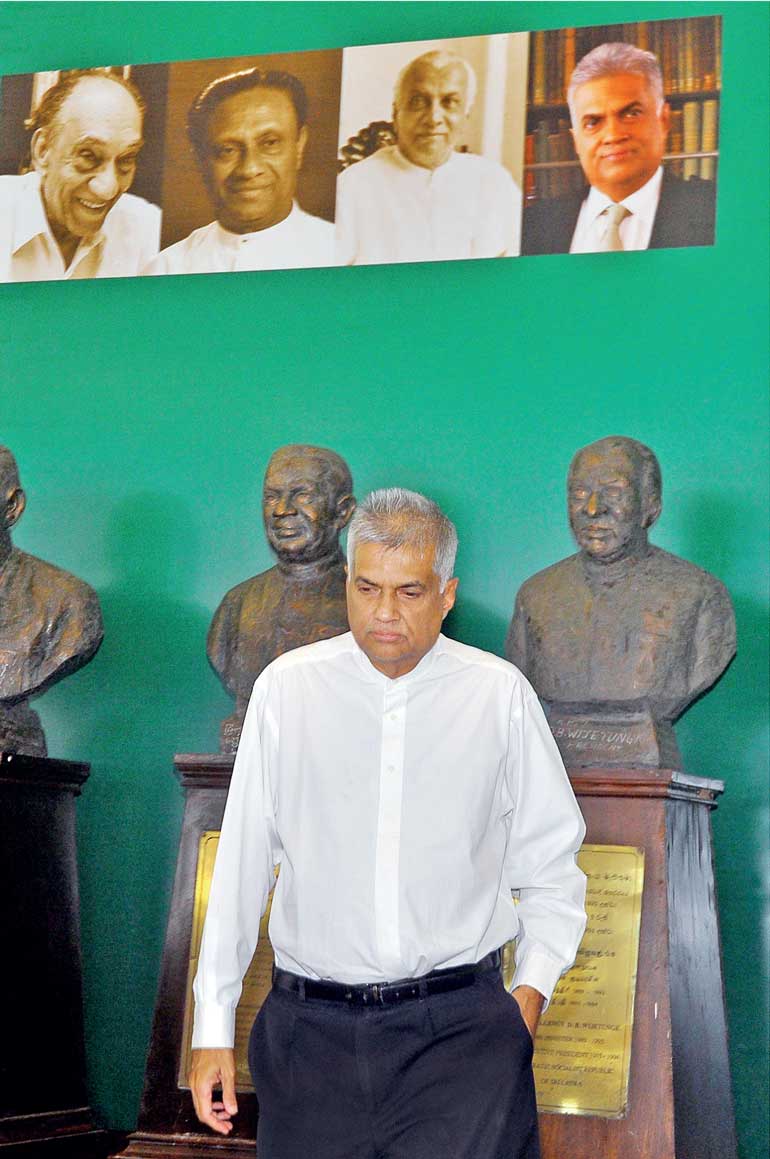Saturday Feb 21, 2026
Saturday Feb 21, 2026
Monday, 2 April 2018 00:00 - - {{hitsCtrl.values.hits}}

Ranil Wickremesinghe
The no-confidence motion is the very last chance for the system to self-correct. If it fails, and the Prime Minister wins, confrontation will be the order of the day and stability will be a mirage.
If the PM prevails in Parliament on 4April, who benefits? If he loses and the no-confidence wins out, who benefits?
What is the scenario if the PM wins?
1. The PM and by association, the Government, will remain delegitimised by the bond scam.
2. The Government will be either be more divided than ever or will be devoid of much of its moderate-centrist component, the SLFP.
3. Socioeconomic protests will resume and intensify because of his policy package and the austerity measures he will introduce to stabilise the economic crisis.
4. Ethnic polarisation and ultra-nationalist resistance will grow as he moves on ethno-constitutional reform and the Geneva resolution.
5. The oppositional space will be enlarged by the infusion of a large number of SLFP MPs who wish to avoid electoral elimination by remaining in his company.
6. Oppositional tactics will become more confrontational as special courts are used to victimise political opponents in the run-up to national elections next year.
7. The Government will be rocked by street protests from multiple sources and finally defeated at next year’s elections leaving a bloody aftermath and a more militantly majoritarian nationalist successor regime.
What is the scenario if the PM loses the no-confidence vote?
1. Everyone including his party the UNP will get that rarest of opportunities: a second chance; a chance to turn the page; to write a new chapter; to course correct and move on.
2. Political confrontation will lose its sharper edges. New patterns of outreach and shifting consensus will become possible. A new dynamic may emerge.
Caught in a conundrum
If the PM wins, the UNP loses because it will be saddled with a man who has minimal public appeal and will further ruin the UNP’s electoral performance and prospects (whatever the token reshuffle of posts he engages in within the party, short of resignation).

What is most striking is that no one wishes to take over the leadership of the UNP at this moment because it will be impossible to resuscitate it and no prospective leader wishes to lose an election. This is how badly the UNP has been wrecked by Ranil’s leadership!
Some prospective leaders may accept the post of presidential candidate but that too is doubtful and the grapevine has it that the preference of the most likely successor is to take over the party after the 2020 election. Even if a successor takes over in time for the presidential election, he is unlikely to be able to effect the kind of dramatic turnaround that would be necessary for an unexpected win in a context of heightened anti-incumbency emotions.
If the PM wins the no-confidence motion the President loses out, because he will be saddled with a partner who has an electorally toxic effect on his base, the SLFP. President Sirisena knows that even if he is the ‘Hansaya II’ candidate in 2019, he will lose, due to the unpopularity of the Ranil-Mangala UNP’s neoliberal minoritarianpolicies. Even his best case scenario of a Sajith supported candidacy, a replay of 2015 is unlikely to succeed, given the downward spiral of the economy. Against such an economic backdrop, Sajith’s input and that of the minorities, is unlikely to able to match MahindaRajapaksa’s, as prospective political partner/investor.
Whichever way the no-confidence motion plays out, there is no downside for MahindaRajapaksa and the JO. Unless he is outflanked or offered some competition in that department by President Sirisena and the SLFP in the next few days, he would have renewed his role as the leader of the anti-UNP struggle and the progressive patriotic forces.
If the PM wins, and the SLFP stays in Government, it will be caught both ways. It will be kicked around by the UNP and it will lose whatever is left (13%) of its vote. What the SLFP needs to do if the PM wins is to make a dramatic cross-over immediately after the vote on the night of 4 April 4, either joining the JO or constituting itself a liberal nationalist opposition together with the UNPers who may have voted for the motion.
Such a moderate nationalist grouping can become an ally of the JO, recreating the traditional center-left anti-UNP alliance. Between the JO-SLPP’s 40%-45% and the SLFP’s 13%, victory at all future elections is assured. This would help President Sirisena too, as the SLFP in Opposition would be his shareholding in the growing oppositional space.
The TNA would also have to vacate its undeserved, artificial occupation of the leadership of the Opposition. Ironically, it would be far better for the TNA’s Sampanthan were the PM to lose and the SLFP to remain in office with JO support as the new government, rather than for the PM to win and the SLFP to come into the Opposition tipping the balance in favor of MahindaRajapaksa or his nominee Dinesh Gunawardena as Opposition leader!
Consequences of no-confidence motion
If the PM loses and the no-confidence motion is carried, then several possibilities open up.
I. The same government minus Ranil, but with a reshuffle.
II. A government of the UNP dissidents and the SLFP, backed by the JO, in which a dissident UNPer is the PM.
III. A government of the UNP dissidents and the SLFP, under SLFP dominance, backed by the JO, with an SLFP PM.
IV. A government of the SLFP, backed by the JO.
V. A government of the SLFP with selective/token JO participation.
VI. A power sharing arrangement between the SLFP and the JO, with or without minimal UNP (dissident) participation.
VII. An interim government, of the SLFP backed by the JO, transitional to early general elections.
If any of these scenarios come to pass, it will amount to a positive outcome, for three reasons:
1. The Government would have shifted from the neoliberal globalist Right towards the moderate Center.
2. The reconfigured government will be more in keeping with – though not exactly reflective of -- the actual electoral balance in the country as a whole.
3. It will be more broad-based and therefore, more ensure greater stability.
In any of the post-Ranil scenarios, the upside greatly outweighs the downside. The only scenario in which the downside greatly outweighs the upside, is a victory for the PM in the no-confidence vote. That outcome is clearly the worst case scenario.

However, even the scenario of a win for the PM on 4April is not entirely devoid of an upside. If one is not looking at things from the perspective of the national and the public interest, as I try to as a political scientist, but from a strictly partisan perspective of an oppositional electoral sweep, what could be a more delightfully entertaining prospect for a nationalist-populist opposition than to have most of the SLFP as ally and all of the SLFP votes in the kitty, while RanilWickremesingheis one’s rival, against the backdrop of surging taxes and a sinking economy?
Diaspora pundits and Ranil’s Fifth Columnists within the oppositional space clutch at the straw of the possibility of MahindaRajapaksa supporting the UNP and JVP to abolish the Executive Presidency when the JVP moves a resolution to that effect later this month. This is whistling in the dark—the same tune that went all discordant when Mahinda gave the thumbs-up for the no-confidence motion, a thumbs-up without which the JO’s move would have been utterly unthinkable, belying the theory that he was a political partner of RanilWickremesinghe.
Those who expect the JO to support the UNP and JVP in the abolition of the executive Presidency simply do not know what’s going on, on the ground, including the mood in the JO which drove the no-confidence motion. This was best exemplified in a TV debate last week which featured the UNP, SLFP, JVP and JO-Pohottuwa. A rising star of the JO, RoshanRanasinghe, the young MP for Polonnaruwa and lawyer, stridently said that he “supports President JR Jayewardene’s executive presidential system” and that “it was wrong for the wings of the Presidency to have been clipped so closely by the 19th amendment thereby contributing to the present deadlock and crisis in the country”, and that “the country needs a strong, rebuilt, executive Presidency”.
That is the mood in the JO: a natural, instinctive rebellion against the rightist RanilWickremesinghe, a reversion to “strong statism” which is the hallmark of patriotic populism from Putin to Ortega to Chavez-Maduro to Erdogan, and a revulsion towards the ultra-liberalism and state–retreat of the Yahapalanaya‘Yeltsin’ years. The JO is opposed not only to Ranil but also to ideological Ranilism--the ideology of the weakened and de-centered state.
The Government delegation’s stand in and after Geneva signaled that the Sri Lankan state is back. SarathAmunugama said that Sri Lanka will not continue to be a “supplicant” at the UN and will not “make representations to it beyond 2019”.
On a continuum, but of much greater strategic consequence of course, President Sirisena dealt a blow to Prime Minister Wickremesinghe’s “economic deep state” by carving away his economic functions by means of a mere gazette (which went unchallenged)! This was just a week after constitutional pundit Dr. NihalJayawickrema, writing from Eton, UK, pontificated that “…the President… still possesses a few, relatively unimportant powers in respect of provincial administration and the appointment of President’s Counsel...”!
If the PM were to win on 4April, he would be caught in a pincer from above, below and the flanks, with the JO and the SLFP constituting a powerful Opposition, and Presidential Sirisena still in office. Mr. Wickremesinghe and the UNP would find it impossible to govern.
If the PM were to survive and govern with the support of the TNA, then the UNP will effectively be wearing a political cyanide capsule. So hostile will be the public and electoral reaction to such an alignment and its obvious policy path.